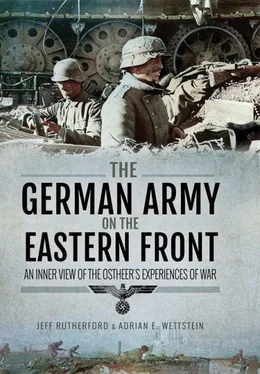b) Under the threat of the death penalty, the population is to be called upon, through posters on walls, to give up weapons and ammunition, as well as to report hidden Red Army men and people in the villages not from there. Posters will be sent to the divisions.
c) Immediate arrest of the village elders employed by the Reds and other leading personalities and search for suspicious elements with the aid of informants [ Vertrauensleuten ].
Enemy agents are to be immediately handed over to the Secret Field Police branch, for the quickest transfer to the Abwehr [German military intelligence]. As long as they can be convicted by the unit, suspicious elements are to be sentenced after the decision of an officer with the disciplinary authority of a regimental commander.
d) As local agents, Hilfswillige who have already proved themselves should be deployed at first, so far as possible. They should wear civilian clothes to camouflage themselves for this purpose. A further task for these Hilfswillige must also be to find trustworthy people within the resident civilian population. With the selection of trustworthy people from the civilian population left behind, the greatest caution is required, especially towards such people who have already stood in German service and now voluntarily offer their services again.
3) The replacement of the village elder positions requires an especially thorough vetting of the persons selected for that position. The discrete questioning of as large as possible circle of people is the best way to avoid mistakes. The newly appointed mayor is immediately to record all inhabitants found in the town in a list of inhabitants. They are further instructed to report immediately to the nearest Wehrmacht office Red Army men and people not native to the area.
4) For the treatment of the population, the raising of labourers and so on, the previously given orders are valid. Encroachments are to be prevented under all circumstances. It depends on to again win over for German interests the population aggravated by the events of the winter.
5) Illegal collection of the population’s private property or extortion of foodstuffs is plundering. Plundering is to be cracked down on with all severity. The troops are to be instructed again…
Several themes emerge in this document. First, the importance of prisoners of war for labour and for filling the ranks of the Hilfswillige was emphasized and with this came a demand for proper treatment of them. This suggests that similar earlier orders were not being carried out by German soldiers, as well as the fact that the army recognized the values of these men for the war effort. Second, the integration of civilian workers – both male and female – was to continue apace. Third, Germany’s industrial weakness relative to its enemies led the army to implement a massive scavenging and recycling program. Finally, treatment of the surrounding population consisted of strict security practices leavened by attempts to win over hearts and minds. In many ways, the essence of German occupation goals in the Soviet Union – shorn of the ruthless anti-Semitism and anti-Bolshevism that provided the occupation with so much of its destructive energy early in the war – is captured by this order.
Six weeks later, the 7th Infantry Division – operating under the designation 407th Infantry Division during the lead-up to Operation Citadel – released its own version of Ninth Army’s order to its men. Similar issues are covered in this order, as the necessity of civilians for the Reich labour action, as well as the importance of Soviet POWs and scavenged material for the war effort, was discussed. The primary difference is that the division order attempted to convince the men of the necessity German policies in the East. Equal parts cajoling and evidence based, the order placed the occupation policy of 1943 into the larger context of the entire war in hopes of persuading the individual German soldier to carry out the policies deemed necessary for victory. [42]
At this time, the need for labour in the Heimat and in the eastern territory is in no way covered. The consumption of raw materials is in the process of continually rising, the situation on the raw material market is critical. Both areas are of a decisive nature for the war.
Up until now, the attitude of the troops to these things in no way corresponds to their true importance. A fundamental change must be created here through continual instruction of all soldiers and officials. In particular, it is again found that our previous attitude towards Russian prisoners of war and the civilian population was incorrect and its effects have brought tremendous setbacks in the Heimat as well as in the eastern territory.
All threatening of the population is to be avoided in the future. The population is to be clarified about [anti-partisan] special measures through reasonable explanation, propaganda-prepared interventions of the Russian mayor, and all other available means. The appearance of brutal rape is to be avoided. All measures in the future will be uniformly guided from above to avoid individual duty stations working against one another and thereby conditionally influencing the civilian population from various points of view.
1) Labour Action
During the beginning of the Russian labour action in Heimat industries, there were terrible experiences that were induced by the lack of rations, clothing, and general care. The efficiency of German workers was thereby only about 30% achieved. After the elimination of these grievances, the efficiency of the Soviet workers increased to the present level of 70-130%. The illness numbers sunk to 2% against the cases of illness for German labour at 3%. In contrast, the number of illnesses in the eastern territories increased from 5.1% to 25.7% in the year 1942 as a result of a poor diet. The curve is still sloping upwards.
Care in all areas is significantly easier and better in the Reich than in the East. There are measures underway to eliminate the previously existing evil after taste with being sent for the labour action in the Reich. The East insignia that all eastern workers in the Reich had to wear previously has been abolished. The people can go out on specified days and visit public entertainment sites. The Soviet worker proves his gratitude for this care through increased labour performance.
The occupation of the eastern area demands a tremendous quantity of labour. Every time territory is gained, this number increases. Due to the existing lack of labourers, the volume of work can only be raised through an increase in the efficiency of work force labouring in the east. Through the improvement of diet and proper treatment, success has already been achieved.
Forced measures in the pursuit of labour are to be avoided. Propaganda alone must lead to the goal. The demands on labourers are absolutely to be paid. In future operations, a worker-registration and collection organization will be deployed early on. It is to be supported by the troops, in which the registration and collection of specialists is especially important.
With complete recognition of the troops’ concerns in the operational area, the troops are again and again to be instructed about the labour action’s decisive importance for the war. Every soldier sets an example for the population through his conduct and therefore decides in miniature the success of the labour collection action.
2) Prisoners of War
The flawed treatment of the prisoners of war in the winter 41/42 is heavily to blame for today’s existing labour shortage. On top of that, these things became known in the Red Army and this led to a dramatic fall in prisoners of war and deserters. Every Russian feared captivity and fought therefore to the end. The result was an increase in our own casualties.
Читать дальше






![John Stieber - Against the Odds - Survival on the Russian Front 1944-1945 [2nd Edition]](/books/405234/john-stieber-against-the-odds-survival-on-the-russian-front-1944-1945-2nd-edition-thumb.webp)





